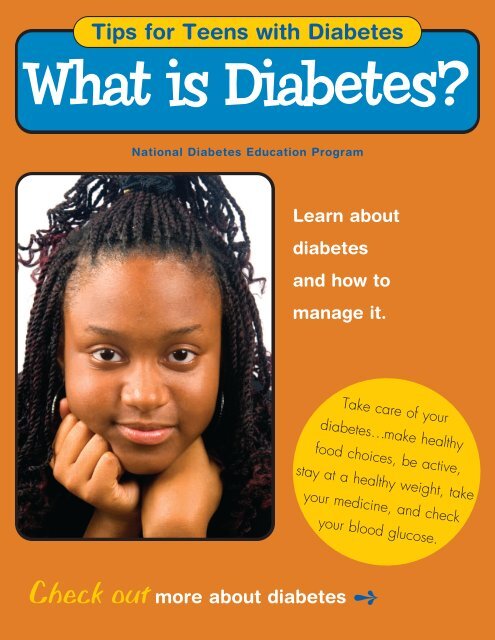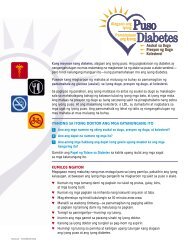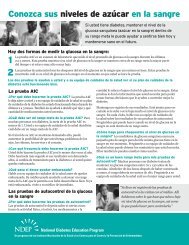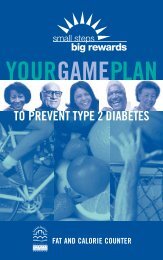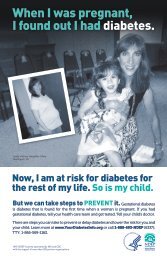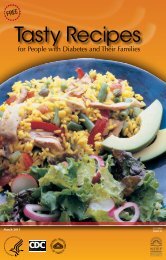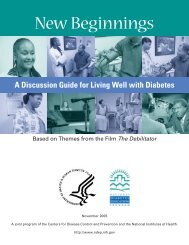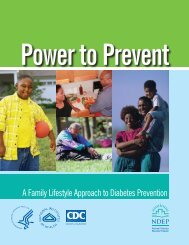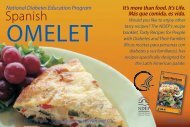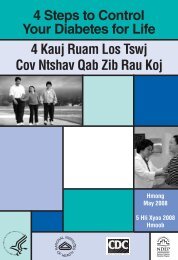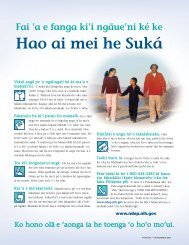Teen Tips - What is Diabetes - National Diabetes Education ...
Teen Tips - What is Diabetes - National Diabetes Education ...
Teen Tips - What is Diabetes - National Diabetes Education ...
Create successful ePaper yourself
Turn your PDF publications into a flip-book with our unique Google optimized e-Paper software.
<strong>Tips</strong> for <strong>Teen</strong>s with <strong>Diabetes</strong><br />
<strong>What</strong> <strong>is</strong> <strong>Diabetes</strong>?<br />
<strong>National</strong> <strong>Diabetes</strong> <strong>Education</strong> Program<br />
Learn about<br />
diabetes<br />
and how to<br />
manage it.<br />
Take care of your<br />
diabetes…make healthy<br />
food choices, be active,<br />
stay at a healthy weight, take<br />
your medicine, and check<br />
your blood glucose.<br />
Check out more about diabetes ➺
Take Care of Your <strong>Diabetes</strong>!<br />
<strong>What</strong> <strong>is</strong> diabetes?<br />
<strong>Diabetes</strong> means that your blood glucose (GLOO-kos), also called blood<br />
sugar, <strong>is</strong> too high. Glucose comes from the food you eat and <strong>is</strong> needed to<br />
fuel our bodies. Glucose <strong>is</strong> also stored in our liver and muscles. Your<br />
blood always has some glucose in it because your body needs glucose for<br />
energy. But having too much glucose in your blood <strong>is</strong> not healthy.<br />
An organ called the pancreas (PAN-kree-as) makes insulin (IN-suh-lin).<br />
Insulin helps glucose get from your blood into your cells. Cells take the glucose and turn it into energy.<br />
If you have diabetes, the pancreas makes little or no insulin or your cells cannot use insulin very well.<br />
Glucose builds up in your blood and cannot get into your cells. If your blood glucose stays too high,<br />
it can damage many parts of the body such as the heart, eyes, kidneys, and nerves.<br />
Are there different types<br />
of diabetes?<br />
Yes. There are three main types of diabetes.<br />
In type 1 diabetes, the cells in the pancreas that<br />
make insulin are destroyed. If you have type 1 diabetes,<br />
you need to get insulin from shots or a pump everyday.<br />
Most teens can learn to adjust the amount of insulin<br />
they take according to their physical activity and eating<br />
patterns. Th<strong>is</strong> makes it easier to manage your diabetes<br />
when you have a busy schedule. Type 1 used to be<br />
called “insulin dependent” or “juvenile” diabetes.<br />
In type 2 diabetes, the<br />
pancreas still makes some insulin<br />
but cells cannot use it very well.<br />
If you have type 2 diabetes, you<br />
may need to take insulin or pills<br />
to help your body’s supply of<br />
insulin work better. Type 2 used to<br />
be called “adult onset diabetes.”<br />
Now more teens are getting type 2, especially if they<br />
are overweight.<br />
Gestational (jes-TAY-shon-al) diabetes<br />
<strong>is</strong> a type of diabetes that occurs when women are<br />
pregnant. Having it ra<strong>is</strong>es their r<strong>is</strong>k for getting<br />
diabetes, mostly type 2, for the rest of their lives. It<br />
also ra<strong>is</strong>es their child’s r<strong>is</strong>k for being overweight and<br />
for getting type 2 diabetes.<br />
Why do teens get<br />
diabetes?<br />
be<br />
active<br />
Both genes and things like viruses and toxins<br />
may cause a person to get type 1 diabetes.<br />
Studies are being done to identify the causes of<br />
type 1 diabetes and to stop the process that<br />
destroys the pancreas. Researchers can now<br />
predict who <strong>is</strong> at r<strong>is</strong>k for developing type 1<br />
diabetes and in the future may be able to<br />
prevent or delay the onset of the d<strong>is</strong>ease.<br />
Being overweight increases the r<strong>is</strong>k for<br />
type 2 diabetes. <strong>Teen</strong>s who make unhealthy<br />
food choices, are not physically active, or who<br />
have a family member with<br />
diabetes are<br />
more likely<br />
to get type<br />
2 diabetes.<br />
Some racial<br />
groups have<br />
a greater<br />
chance of<br />
getting<br />
diabetes—<br />
American Indians, Alaska Natives, African<br />
Americans, H<strong>is</strong>panics/Latinos, Asian Americans,<br />
and Pacific Islanders. It <strong>is</strong> not true that eating<br />
too much sugar causes diabetes.
<strong>What</strong> do I need to do to<br />
take care of my diabetes?<br />
The key to taking care of your diabetes <strong>is</strong> to keep<br />
your blood glucose as close to normal as possible.<br />
The best way to do th<strong>is</strong> <strong>is</strong> to:<br />
• make healthy food<br />
choices<br />
• eat the right<br />
amounts of food<br />
• be active everyday<br />
• stay at a healthy<br />
weight<br />
• take your medicines<br />
and check your blood<br />
glucose as planned<br />
with your health<br />
care team<br />
Your doctor will tell you<br />
what blood glucose level <strong>is</strong> right for you. Your goal<br />
<strong>is</strong> to keep your blood glucose as close to th<strong>is</strong> level<br />
as you can. Your doctor or diabetes educator will<br />
teach you how to check your blood glucose with a<br />
glucose meter.<br />
It helps to know what affects your blood glucose<br />
level. Food, illness, and stress ra<strong>is</strong>e your blood<br />
glucose. Insulin or pills and being physically active<br />
lower your blood glucose. Talk with your doctor or<br />
diabetes educator about how these things change<br />
your blood glucose levels and how you can make<br />
changes in your diabetes plan.<br />
Carbohydrates (CAR-boh-HY-drates), or carbs for<br />
short, are a good source of energy for our bodies.<br />
But if you eat too many carbs at one time,<br />
your blood glucose can get too high. Many<br />
foods contain carbs. Great carb choices include<br />
whole grain foods, nonfat or low-fat milk, and fresh<br />
fruits and vegetables. Eat more of them rather than<br />
white bread, whole milk, sweetened fruit drinks,<br />
regular soda, potato chips, sweets, and desserts.<br />
➺ www.Your<strong>Diabetes</strong>Info.org<br />
Why do I need to take<br />
care of my diabetes?<br />
If you take care of your diabetes you can lower your<br />
r<strong>is</strong>k for other health problems. High blood glucose<br />
can harm blood vessels and cause heart attacks or<br />
strokes. It can also damage organs in the body and<br />
cause blindness, kidney failure, loss of toes or feet,<br />
gum problems, or loss of teeth.<br />
The good news <strong>is</strong><br />
that when you<br />
take care of your<br />
diabetes, you can<br />
reduce or avoid<br />
these problems.<br />
Do not let<br />
diabetes stop<br />
you! You can do<br />
all the things<br />
your friends do<br />
and live a long<br />
and healthy life.<br />
Whole<br />
grain foods,<br />
nonfat or low-fat<br />
milk, fresh fruits,<br />
and vegetables<br />
are great carb<br />
choices.<br />
Do<br />
not let<br />
diabetes<br />
stop you!<br />
The key to taking care of<br />
your diabetes <strong>is</strong> to keep your<br />
blood glucose as close to<br />
normal as possible.
Learn more!<br />
Check out…<br />
<strong>National</strong> <strong>Diabetes</strong> <strong>Education</strong> Program to get free<br />
copies of other tip sheets for teens<br />
• Be Active<br />
• Stay at a Healthy Weight<br />
• Make Healthy Food Choices<br />
• Dealing With the Ups and Downs of <strong>Diabetes</strong><br />
• Lower Your R<strong>is</strong>k for Type 2 <strong>Diabetes</strong><br />
www.Your<strong>Diabetes</strong>Info.org • 1-888-693-NDEP<br />
American Association of <strong>Diabetes</strong> Educators to<br />
find a diabetes educator near you<br />
www.diabeteseducator.org<br />
1-800-338-DMED (1-800-338-3633)<br />
American <strong>Diabetes</strong> Association for help to manage<br />
diabetes<br />
www.diabetes.org/planetD<br />
1-800-DIABETES (1-800-342-2383)<br />
Special thanks to the teens who<br />
helped create th<strong>is</strong> tip sheet<br />
American Dietetic Association to find a dietitian<br />
near you<br />
www.eatright.org • 1-800-366-1655<br />
Bam! Body and Mind website for help to stay healthy<br />
www.bam.gov<br />
Children With <strong>Diabetes</strong> website for more about kids<br />
and families with diabetes<br />
www.childrenwithdiabetes.com<br />
Juvenile <strong>Diabetes</strong> Research Foundation<br />
International for help to manage diabetes<br />
www.jdrf.org • 1-800-223-1138<br />
<strong>National</strong> <strong>Diabetes</strong> Information Clearinghouse for<br />
more about diabetes<br />
www.diabetes.niddk.nih.gov • 1-800-860-8747<br />
WIN – Weight-control Information Network for<br />
weight control help<br />
• Take Charge of Your Health! A <strong>Teen</strong>ager’s Guide to Better<br />
Health<br />
www.win.niddk.nih.gov/publications/take_charge.htm<br />
1-877-946-4627<br />
Francine Kaufman, M.D., Head, Center for <strong>Diabetes</strong>, Endocrinology and Metabol<strong>is</strong>m at Childrens Hospital Los Angeles and<br />
Janet Silverstein, M.D., Professor and Chief, Pediatric Endocrinology, Department of Pediatrics, University of Florida, Gainesville, FL<br />
reviewed th<strong>is</strong> material for technical accuracy.<br />
www.Your<strong>Diabetes</strong>Info.org<br />
The U.S. Department of Health and Human Services’ <strong>National</strong> <strong>Diabetes</strong> <strong>Education</strong> Program <strong>is</strong> jointly sponsored by the <strong>National</strong> Institutes of Health and<br />
the Centers for D<strong>is</strong>ease Control and Prevention with the support of more than 200 partner organizations. www.Your<strong>Diabetes</strong>Info.org or 1-888-693-NDEP<br />
Rev<strong>is</strong>ed November 2007 NIH Publication No. 08-5295 NDEP-63


